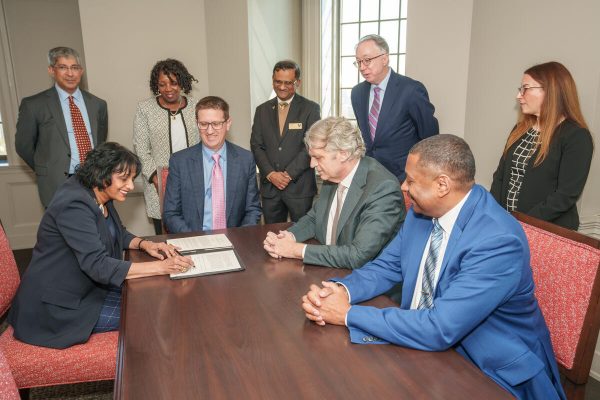In an expansion of its research and innovation partnerships in defense, Vanderbilt University signed a new education partnership agreement with the U.S. Army Development Command’s Chemical Biological Center (DEVCOM CBC), whose primary mission is to defend the nation against chemical and biological threats.

The partnership is a strategic initiative intended to leverage Vanderbilt’s academic strengths in biology, chemistry, and many related fields and DEVCOM CBC’s innovative research and development capabilities. This partnership is similar to Vanderbilt’s earlier education partnership agreement with the Army Futures Command, which led to the highly successful Pathfinder program .
“Vanderbilt is proud to be a partner, collaborator and consultant in strengthening our nation’s defenses and security,” Chancellor Daniel Diermeier said. “This important partnership expands our portfolio of engagements in which we’re translating our research and innovation into real-world defense solutions and educating the next generation of scientists and engineers in the process.”
By promoting collaborative research and educational activities, the agreement aims to translate research into practical, real-world solutions that improve national defense capabilities while educating the next generation of scientists and engineers.
In celebration of the new agreement, the Office of the Vice Provost for Research and Innovation hosted Michael Bailey, DEVCOM CBC’s director, and Eric Moore, deputy to the commanding general at DEVCOM, along with some of their staff on campus for a series of faculty engagements to explore collaborative projects that could be advanced under the new agreement. Similar to the Pathfinder program, the new agreement with DEVCOM CBC aims to foster work that will have a rapid, positive impact on national defense.
“We will try to transform the way the Army protects its soldiers and mitigate chemical and biological threats,” Bailey said. “This involves exploring new technologies and integrating them into the Army’s platforms and networks. Our aim is to enhance soldier safety by making our defense mechanisms more efficient and integrated.”
In addition to presentations and conversation with faculty from across campus, the visit also featured tours through several of Vanderbilt’s unique and noteworthy research spaces, including the Crowe Laboratory, Center for Integrative Technology, and Vanderbilt Institute for Chemical Biology among others. Each tour highlighted Vanderbilt’s advanced facilities and commitment to practical, transformative solutions to pressing challenges and exciting opportunities in defense and protection of soldiers and gave DEVCOM CBC leaders the opportunity to discuss key priorities with Vanderbilt faculty experts.
For example, during his tour of the Vanderbilt Institute of Nanoscale Science and Engineering (VINSE), Bailey mentioned deep interest in collaborating on materials that can automatically neutralize chemical agents so soldiers don’t have to go through laborious decontamination processes before they can remove affected clothing, while host Sharon Weiss described the institute’s cutting-edge facilities and path-breaking research including nanomaterials that can rapidly detect chemical or biological threats to protect soldiers.
“Vanderbilt leads in chemical biology by bringing science, engineering and computing together to enhance our understanding of everything from cells to complex systems,” said Vice Provost for Research and Innovation Padma Raghavan. “This new partnership with DEVCOM CBC is an ideal opportunity for our teams to collaborate around DEVCOM CBC’s need to protect against chemical and biological threats and Vanderbilt’s strengths at the bio-nano interface.”